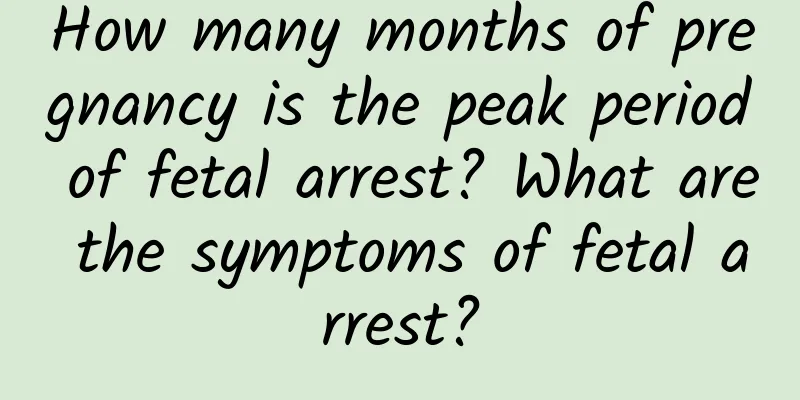How many months of pregnancy is the peak period of fetal arrest? What are the symptoms of fetal arrest?

|
We all know that after a woman becomes pregnant, her body will undergo many changes, and the fetus will continue to grow and develop in the mother's belly. However, some pregnant mothers may also experience fetal growth retardation during pregnancy, which is also a common problem during pregnancy. So how many months of pregnancy is the peak period for fetal growth retardation? Let's take a closer look! The first few months of pregnancy are the peak period of fetal arrestAfter pregnancy, the pregnant woman's psychology becomes particularly fragile. She will be more worried during the entire pregnancy. In the middle and late pregnancy, she is afraid of premature birth of the fetus. In the early pregnancy, pregnant women are most afraid of fetal growth retardation. Fetal growth retardation usually occurs in early pregnancy, when the embryo has just begun to develop and is not yet stable. The connection between the lower segment of the uterus and the placenta is not tight enough, making the fetus prone to miscarriage. In the middle and late stages of pregnancy, the fetus gradually matures and is not easily miscarried due to external influences. Therefore, the peak period for fetal growth retardation is 6-12 weeks in early pregnancy. Abnormal embryonic development - poor sperm or egg quality, chromosomal abnormalities in one of the spouses - insufficient flavonoids in the pregnant woman's body, uterine malformations, endometriosis, hyperprolactinemia, and abnormal thyroid function can also lead to fetal growth retardation, of which more than 90% are caused by poor development of the embryo itself. Why does the fetus stop growing after pregnancy?1. Sperm and egg quality issuesWhen the quality of sperm or egg is poor, it is difficult to form a fertilized egg during the combination process. Even after the fertilized egg takes root in the uterus, the quality of the fertilized egg is still problematic. Therefore, it is possible that the subsequent fission and differentiation process will be terminated. This is a law of survival of the fittest in nature. Fertilized eggs of poor quality cannot adapt to cell fission and formation, so they will be eliminated. 2. External stimulationThe embryo that has just taken root and developed in the mother's body can be affected by any harmful external stimulation, such as radiation, invasion of toxic substances, viral infection, or the influence of drugs. When the fetus develops in the mother's body and is harmed and stimulated, it will not be able to undergo fission development smoothly, and eventually all work will stop. 3. Maternal uterine problemsThe uterus is where the fetus grows and develops. Only good land can give birth to a healthy baby. When the mother's uterus is deformed and not conducive to the living environment of the fetus, the fetus cannot grow smoothly in such an environment, just like a seed cannot germinate and grow in poor land. The mother's uterus is the land that nurtures the baby. 4. Endocrine disordersWhen the fertilized egg implants, the ovary will secrete a large amount of progesterone, which provides the fission and growth of the embryo. If the pregnant mother's endocrine system is out of balance, these progesterone will most likely be reduced to support the development and growth of the embryo, and eventually lead to fetal arrest. Generally speaking, in addition to external impact, unhealthy embryos or maternal problems, such embryos will experience miscarriage or fetal arrest in the first three months of pregnancy. Many people will not be successful even if they try to preserve the fetus. Even if they succeed in preserving the fetus, the chance of giving birth to a deformed baby will be much higher. Of course, it does not mean that all babies do not need to be preserved, but the decision should be made based on the doctor's examination. Most babies are very healthy. What are the symptoms of fetal arrest?1. Pregnancy reaction disappearsThe fetus stops developing and the pregnant woman's body no longer secretes progesterone. The decrease in progesterone will cause the pregnancy reaction to disappear, and the breasts may no longer feel tingling and become larger. 2. Vaginal bleeding in pregnant womenIf the embryo development shows signs of fetal arrest, red or brown bloody secretions will appear in the pregnant woman's vagina. Some embryos will be automatically discharged from the body due to the mother's own protection. The pregnant woman may see a small mass being discharged, but some embryos require surgery to be removed. 3. Pregnant women feel back pain and abdominal distensionIf the fetus does not develop further, the pregnant woman will feel soreness in the waist, swelling in the abdomen, and a strong feeling of falling. Some pregnant women may also feel severe abdominal pain. This may be a sign of miscarriage and she needs to go to the hospital for examination in time. |
Recommend
How to judge whether menstruation is clean
When menstruation comes, a woman's body will ...
What are the basics of Xinjiang barbecue? Can an expert teach you how to make Xinjiang barbecue?
Barbecue has a long history in my country. Some sa...
Can I still do an MRI after having a heart stent placed? Experts from Changsha Fourth Hospital answer your questions
"Doctor, I have a stent in my heart, and now...
Should I lie flat or on my side after a miscarriage?
No matter what the reason for a woman's misca...
Girls have Adam's apple
In daily life, many thin girls cannot stand the p...
Early pregnancy one deep and one shallow diagram
As a convenient product for women to test whether...
Pay attention to these 12 fatal misunderstandings about uremia and avoid them to prolong your dialysis life!
Uremia is a serious disease, but there are many m...
Have you got all the knowledge related to COPD?
Many people have only heard of chronic bronchitis...
Is it normal to go through menopause at 42?
People often say that people are old after the ag...
Artificial knee replacement surgery - the second life of the knee joint
Author: Qu Tiebing, Chief Physician, Beijing Chao...
Generally, a few days of confinement are required for miscarriage
If the pregnancy is less than 13 weeks, women gen...
Drinking Chinese medicine before pregnancy to adjust the gender
In today's society that pursues equality for ...
What is the growing environment of red okra? How to choose red okra
Red okra is known as plant gold. It is known as &...
What to do if a woman has chronic constipation
Many female friends often suffer from constipatio...
Temperature changes after transplantation
Test tube transplantation has become increasingly...









